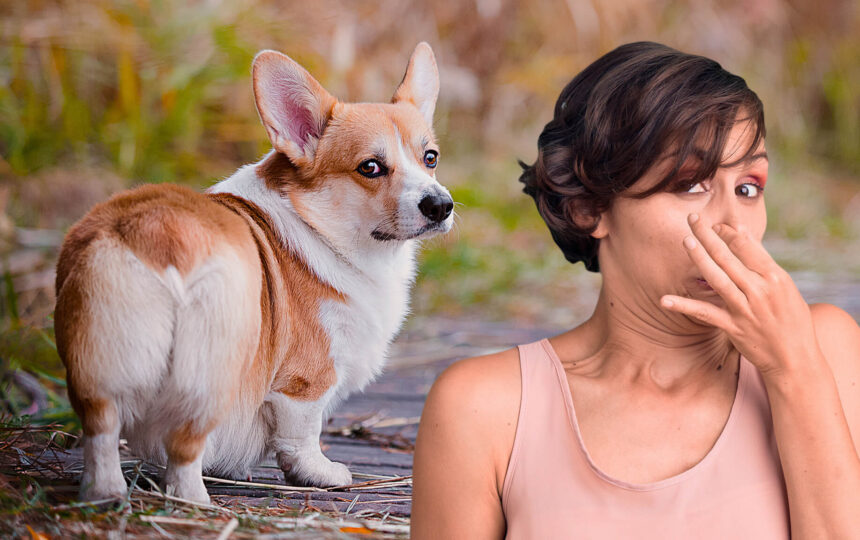Farts can be an embarrassing subject, but there is no denying their power. From the loudest thunderclap to the lightest whisper, farts come in all shapes and sizes.
Everyone farts, right? Even dogs. If you are a pup owner, you have likely experienced the dreaded gas blast at least once. Sometimes they are super stinky, and sometimes there is barely an odor, but they are so loud that they scare you and your dog.
Although some gas is natural in humans and dogs, excessive noise or a strong odor may indicate that your furry friend has some tummy or other troubles that need attention. Listen to what veterinarian Dr. Marthan Cline has to say about pup gas,
“Passing gas can be a normal physiologic occurrence in both cats and dogs, Generally, it can be a problem when a pet experiences excessive volume, unpleasant odor, or when it is associated with another clinical sign—like diarrhea, abdominal pain, or distension.”
In this article, we will unpack some fascinating facts about dog farts and provide key indicators so that you will know when to take your canine companion in for a check-up, make some lifestyle changes, or plug your nose and carry on.
What exactly is a fart? It is really quite simple. When excess gas builds up in the intestinal tract, farts happen. Super stinky gas is produced by bacteria living in the large intestine, where they happily dine on food residue.
Common diet and feeding issues causing gas
If you are trying to get to the bottom of your pup’s persistent passing of gas, you will want to look at what and how you are feeding first.
Air gulping causes gas: Also called aerophagia, swallowing air can cause non-stinky, but sometimes really loud, gas. If your pup gobbles food or water too quickly and doesn’t expel the air in a burp, it will inevitably come out the other end. Some breeds, such as French Bulldogs, are prone to swallowing air due to their face shape. An excellent way to help reduce the amount of air your dog swallows is to use a slow feeder or food puzzle at mealtime or switch to more frequent smaller feeds throughout the day. A water fountain dish can help slow down rapid water intake.
Denatured diets cause sour gas: Conventional dog food can lead to some pretty smelly farts. These foods contain low-quality ingredients that are not well digested, causing a build-up of gas in your pup’s digestive system. Many brands – especially kibble – also include loads of carbohydrates, artificial preservatives, and fillers that can cause even more gas. The best way to avoid such stinky situations is to feed a raw, high-quality diet that doesn’t contain any unnecessary fillers or additives.
Changing your pup’s diet causes gas: If you have recently changed your dog’s diet and noticed an uptick in flatulence, it may be the reason. Don’t ever stop one diet and introduce another quickly. Make the transition slowly, over a week or so, adding a little of the new food with the old to start until your pup is acclimated. If you notice any adverse reactions, scale back and go slower.
Eating trash can cause gas. Fido helped himself to the trash. Is your dog a certified home dumpster diver? Some dogs just have a thing for trash and other nasty stuff. Depending on what they ate, your pup may experience gastrointestinal upset, including stinky farts after a particularly nasty garbage dinner.
Allergies cause gas: Some dogs are prone to allergies that cause gastrointestinal issues such as diarrhea, vomiting, and gas. Allergies may also cause itching, hair loss, ear infections, and facial swelling. Again, conventional dog food and treats containing synthetic materials are often the root cause of allergies.
Common health conditions causing gas
If your pup has the toots, it may be due to health-related issues. Often these issues are accompanied by other symptoms such as diarrhea, vomiting, lethargy, etc.
Inflammation in the gastrointestinal tract causes gas: Many gastrointestinal issues lead to gas, including inflammatory bowel disease (IBD) and colitis, resulting from chronic inflammation of the stomach, small intestine, and colon. When the gastrointestinal tract becomes inflamed, it may cause diarrhea, vomiting, weight loss, along with gas.
According to Dr. Cline
“In my practice as a veterinary nutritionist, I mostly see gas associated with primary gastrointestinal diseases like IBD, food intolerance or hypersensitivity, and colitis. If your pet is uncomfortable or experiencing any other clinical signs associated with their gas, or if you are concerned for any reason, this is a good reason to have your pet checked out by a veterinarian.”
Intestinal parasites cause gas: Parasites, including roundworms and tapeworms, can feed internally off your pup’s food, releasing gasses as they munch. Some parasites produce toxins or enzymes that can irritate the digestive tract, resulting in increased gas production. Parasites may interfere with how the body absorbs and digests food, causing bloating and flatulence.
Constipation causes gas: Constipation can be a severe issue in dogs, especially those dehydrated or consuming kibble. This painful condition is easy to spot – check your dog’s poop and watch for signs of straining when they eliminate. Dehydrated pups often pass gas and have a decreased appetite and lack of energy. Be sure to offer your pup plenty of water, switch to a healthy raw diet, and avoid too much fiber or carbohydrates.
Pancreatitis causes gas: The pancreas is a vital organ that helps to break down proteins and fats. Dietary issues and infections may cause the pancreas to become inflamed, resulting in vomiting, diarrhea, dehydration, abdominal pain, and flatulence.
Intestinal bacterial overgrowth causes gas: A common cause of excessive gas in dogs is an overgrowth of bacteria in the gut. This occurs when the number of bad bacteria outweighs the good bacteria and is often the result of consuming a denatured diet. Symptoms include bloating and increased gas.
When farting isn’t funny
If you notice your dog having stinky gas and other signs like vomiting or diarrhea, it’s best to call your veterinarian for advice, especially if it comes on suddenly.
According to veterinarian Dr. Carlson,
“Normal gas is occasional and shows no signs of being anything out of the ordinary. Any sign of pain along with gas can indicate a few serious causes, such as a foreign body obstruction or bowel torsion. “When it’s painful, it’s an emergency. Pain symptoms in dogs can range from lethargy and hiding to whimpering or wailing.”
Taming your furry friend’s farts
Here are a few things you can do to ease digestive woes and flatulence in our furry friend
- Make sure that your pup’s diet is healthy and properly balanced. Limit the intake of foods high in fiber, fillers, carbohydrates, or fat, and look into switching them to a natural raw food diet.
- Avoid processed treats and those that contain milk, cheese, or, any form of lactose.
- Adopt a regular feeding schedule and avoid giving your pup treats between meals. Also, be sure to watch out for any possible food allergies or intolerances that might contribute to their excessive flatulence.
- Dogs are built to move, so keep yours as active as possible. Exercise helps with digestion and will reduce gas. Walking your pup 30 minutes after eating will help move food through the body and ease gas production.
Make your best gas assessment
If your pup is passing, more gas than usual or the gas is stinky, take the time to assess the issue. Ask yourself some important questions like:
- Are my dog’s farts stinky?
- Did my dog’s farts come on suddenly?
- Have I changed my dog’s food?
- Did my dog get into the garbage?
- Could my dog be dehydrated?
- Am I feeding more or less than usual?
- Does my dog eat his food or drink water fast?
- Is my dog lacking energy or experiencing behavioral issues?
- Is my dog vomiting or having diarrhea or constipation issues?
- Is my dog exhibiting signs of pain?
Once you complete your assessment, you will be better able to take the next steps to tame the gas and ease your canine’s distress. Don’t avoid getting your pup to the vet for care if your assessment results indicate the need for an expert opinion.






